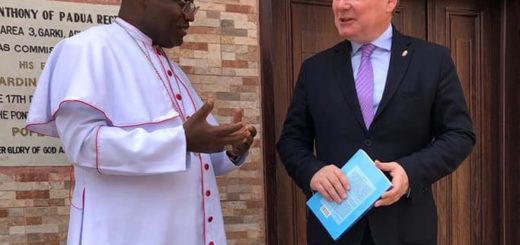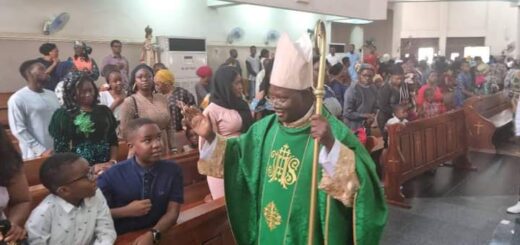Metanoia
by ARCH BISHOP · December 6, 2020
2nd Sunday of Advent. Homily by Archbishop I. A. Kaigama at Infant Jesus Parish, Iddo, Abuja. 6th December, 2020.
Readings Is. 40:1-5, 9-11; Ps. 84(85): 9-14; 2 Pt. 3:8-14; Mk. 1:1-8
I bring greetings to you Fr. Celestine Eze and all your parishioners of Infant Jesus, Iddo. It is providential that after my 1st anniversary of installation yesterday, 5th December, as the Archbishop of Abuja, you are the first parish I am visiting to pray with you and to confirm some parishioners.
The theme of conversion (metanoia) is what dominates the readings today. The preaching of John the Baptist was an invitation to a change of heart and conduct, a turning from rebellion and disobedience towards God, to welcome Jesus Christ.
Repentance (metanoia) means to change from doing evil to doing good and it requires a personal decision. The prodigal son made a decision and said, “I will go home to my father” (Lk. 15:18). Zacchaeus opted to stop his life of corrupt enrichment and welcomed Jesus into his life. Mary Magdalene made the decision to meet Jesus and her life changed for good. It is possible for you and me too.
The Old Testament prophets were concerned about the rebellious and recalcitrant life of the chosen people, in contrast to God’s constant love, kindness and forgiveness. Whether it was Isaiah or Jeremiah or Amos, their prophetic duty was to speak the undiluted message of God to the kings and rulers and their contemporaries. In 2 Samuel 11 we read how David who took the wife of Uriah and reproached by Prophet Nathan, he confessed and was pardoned (cf. Ps. 51).
The people of Nineveh notorious for their life of sin having heard the preaching of Jonah declared a fast and dressed in sackcloth from the smallest to the king (cf. Jonah 3). They were spared by God. In Nehemiah 8 the people were in tears of sorrow for their sin when Ezra read the book of the Law. They confessed their sins and those of their fathers.
As we enter the second gear of our journey through Advent the first reading narrates how Isaiah consoled and gave hope to the exiled Jews in Babylon, giving them Yahweh’s assurance that their 60 years in captivity would soon come to an end and they would return to Jerusalem and to the Temple, a kind of a second Exodus.
John the Baptist, resonating the words of prophet Isaiah in Chapter 40 verse 3 said, “Prepare the way of the Lord, make straight his paths” (Mk. 1:3). Our preparation and readiness is by making the crooked path of our life straight, filling up every valley by engaging in good works, and levelling up every hill and mountain of pride within us and the destructive habits of sin.
In response to John’s preaching the people asked, “What shall we do?” In answer to them John said, “He who has two coats, let him share with him who has none; and he who has food, let him do likewise”. Tax collectors also came to be baptized, and said to him, “Teacher, what we shall do?” and he said to them, “collect no more than is appointed you”. Soldiers also asked him, “And we, what shall we do?” and he said to them, “Rob no one by violence or by false accusation and be content with your wages” (cf. Lk. 3:10-14).
This season of Advent offers Christians the opportunity to engage in self-examination and to seek to answer the question, “What shall we do to receive Christ at Christmas?” In our country we have been stuck in the mud on account of our actions and inactions. Other than suffering severe security problems, we have many IDPs and refugees still exiled from their homes and many Nigerians suffering the negative economic impact of COVID-19. Successive governments have left us with much to be desired. Without judging anyone, we call all to repentance: members of the Presidency, National and State Assemblies, the Judiciary, Governors, Local Government Chairmen, soldiers, politicians, religious leaders, traditional leaders, security agents, youths, elders, etc. We have sinned and failed our country and future generations and the only way we can experience God’s deliverance, for whom as 2 Peter 3:8 says, “a day can mean a thousand years, and a thousand years is like a day,” is to repent sincerely.
To the candidates who today receive the sacrament of confirmation, the Holy Spirit will fortify you and enable you to give greater witness to Christ until He comes. I charge you to emulate John the Baptist by being ardent, fervent and faithful proclaimers of the word of God. As Christians, our witnessing becomes more effective when our lives become the message; when we live out what we preach. Our lives become the Bible that others can read and emulate.
In conclusion, please continue to thank God for the release of our priest (Rev Fr. Matthew Dajo) from captivity. We pray for the unconditional release of those who are still detained in the hands of kidnappers and terrorists. More high level security, especially in the Federal Capital Territory is very urgently needed.
Come Lord Jesus!




